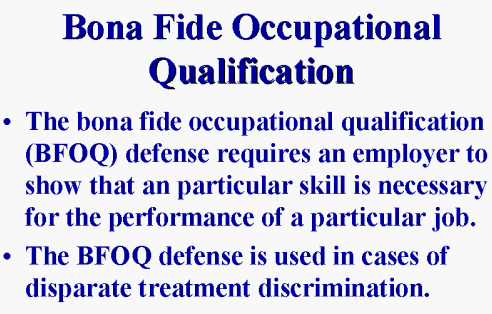Bona Fide Occupational Qualification (Bfoq) is an employment qualification that an employer can legally consider while making decisions about retaining and hiring employees. The qualification is related to the job and is necessary for business operations.

Bona Fide Occupational Qualification
Bfoq is a term used in the US. In Canada, it is called bona fide occupational requirement (Bfor) and in UK, it is called Genuine Occupational Qualification (GOQ).
Explanation
The very nature of the job might require the employer to discriminate against people on the basis of age, gender, religion, nationality, race, or some other protected status. Though such discrimination is generally prohibited under the law, in rare circumstances, such discrimination becomes necessary and Bfoq is the legal method of discrimination.
In order for the discrimination to be legal, the employer must prove that no member of the group being discriminated against can perform the job. For example, to serve drinks in a bar, an employee must have completed 21 years of age. This discrimination on the basis of age is justified and legal and therefore qualifies as a Bfoq exception. The most common exceptions are generally crafted for religion, gender, and age. An employer needs to be extremely careful because the exception may appear to make perfect business sense but might be invalid in the court of law. Hiring only young females in a women’s department store might make perfect business sense for the manager, but the same work can be done with mature females. Therefore, such an exception would not be legal.
Some more examples-
a) Hiring female attendants for the lingerie section of a department store
b) Churches hiring only the members of their church and rejecting clergy from other religions
c) Requirement of proficiency in English and German for a client-facing employee in a firm based out of and having the majority of its client base in Germany.

 Follow
Follow